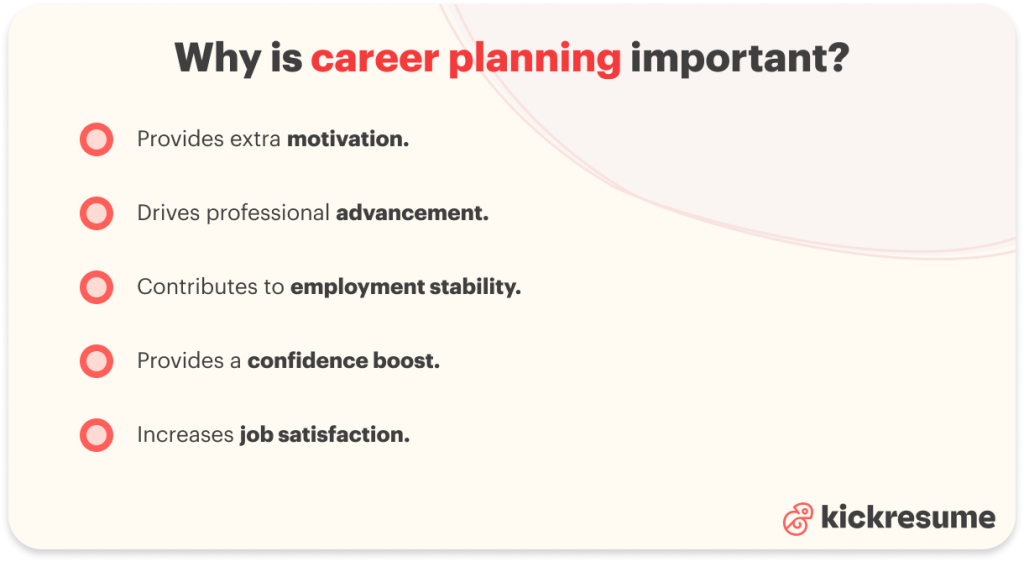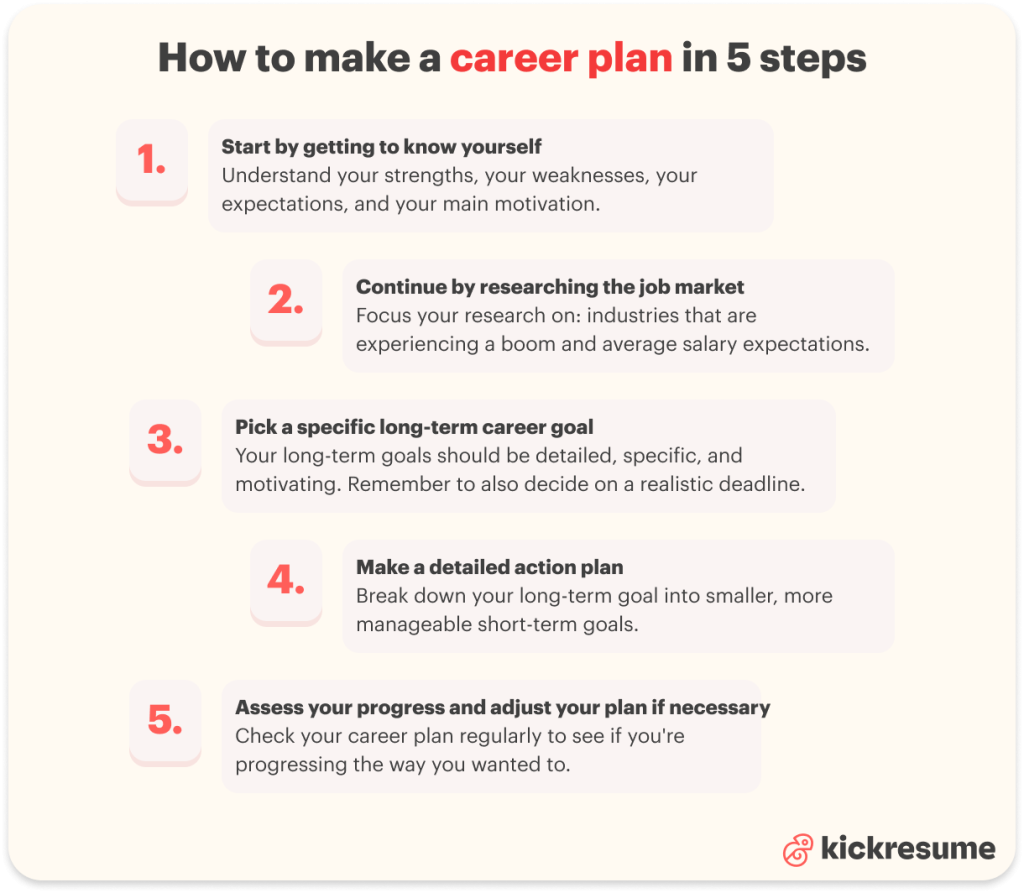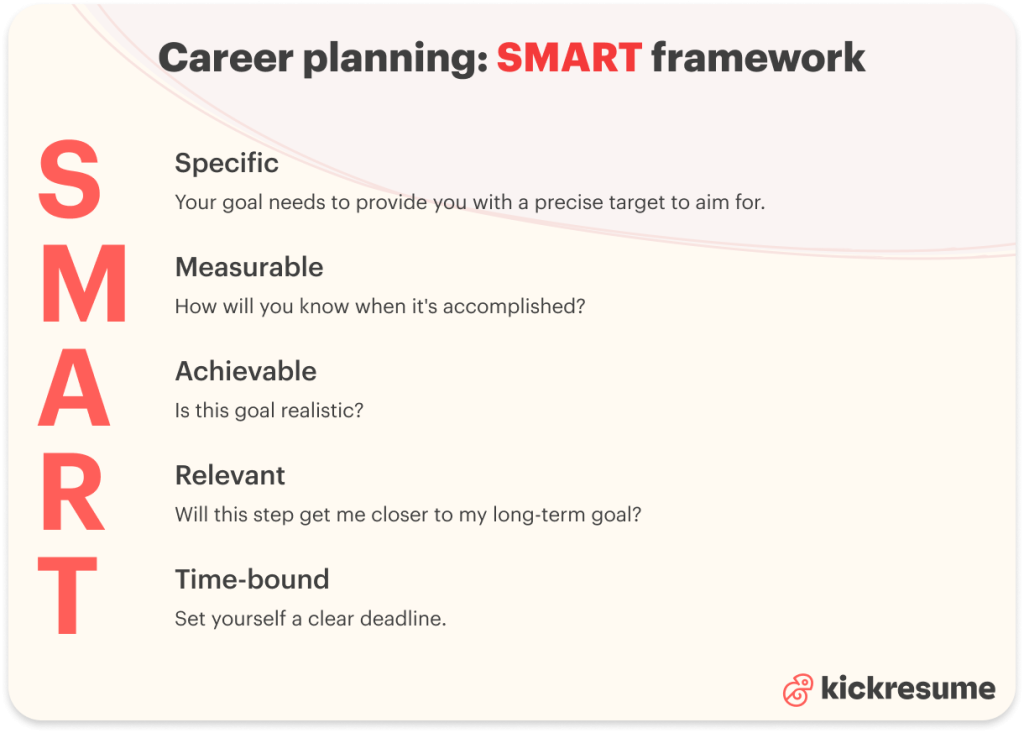Career planning is essential if you want your career to go, well, according to plan!
It helps you focus your efforts, make informed decisions, and avoid aimless job searching. (And I'm not just saying that — there's data to back it up!)
Whether you want a new job, a promotion, or a career change, having a plan makes all the difference.
So, where do you start with career planning? With this article. You're about to find out:
- What is career planning;
- Why is career planning important;
- Who is career planning for;
- And how to make a career plan in 5 steps.
What is career planning?
Career planning is the process of setting your job goals and figuring out the steps to reach them. It helps you match your skills and interests with the right career path, guiding your professional growth.
Simple as that!
Well… okay, it’s not exactly that simple, but we’ll get into that later!
Why start career planning?
The thing is — the opportunities offered by the job market are endless. And without a specific plan in mind, it's easy to find yourself drifting from job to job without any real direction.
But a well-prepared career plan helps you take control, making sure that each step you take moves you closer to wherever you actually want to be.
Here’re 5 more reasons why career planning is worth your while:
- Extra motivation. Firstly, when you plan your career, you set short-term and long-term goals. And these goals act as stepping stones, keeping you motivated and on track. Plus, there's nothing more satisfying than ticking off goals as you achieve them!
- Professional advancement. Studies show that 74% of workers feel that a lack of development opportunities are holding them back from advancing their careers. But with a clear career plan, identifying opportunities for growth becomes easier than ever.
- Employment stability. Thirdly, reports suggest that employees who take the time to map out their professional development options experience 34% higher job stability than those without a career plan.
- Confidence boost. Additionally, having a plan boosts your confidence. In other words, you know what you want and how to get it. And this makes you feel more in control of your future. Plus, a healthy confidence can be a game-changer in job interviews and networking!
- Job satisfaction. Finally, career planning leads to a greater overall job satisfaction. According to reports, 25% of employees would feel more fulfilled with their job if they could do what they do best. But how can you find out what your strong suits are? Through career planning, of course!

Who is career planning for?
You may think that career planning is only useful for students.
But the truth is, anyone who wants to take charge of their professional journey should give it a go, including:
- Students and fresh graduates. Undoubtedly, entering the job market for the first time can be overwhelming and confusing. But with careful planning, it's possible to make the transition smooth and stress-free.
- Entry-level professionals. You already have a couple of professional years under your belt. But you want to take your career to the next level. So, what steps should you take? Luckily for you, career planning can point you in the right direction!
- Experienced professionals. Has your profession failed to live up to its promises? Well, in that case, don't be afraid to start flirting with alternative career paths! After all, it's never too late to reinvent yourself. But be sure to map out your options before you actually decide to make the move.
- Pre-retirees. Or, maybe you're slowly approaching that sweet retirement. But what if there are still some milestones left to reach? Well, there's still time! So, start planning your final career goals and finish your professional journey on a high.
See? Anyone, regardless of their professional stage, can reap the rewards of investing time in a bit of career planning!
How to make a career plan in 5 steps
Remember when we told you that career planning isn't all that simple? Well, what we really meant to say is that it can be quite time-consuming.
But the steps to crafting the perfect career plan are actually pretty straightforward. So, how many stages in career planning should you cover?
If you'd like to make a career plan of your own, follow this simple guide:
- Start by getting to know yourself.
Understanding your needs and talents is essential for devising a successful career plan. Make sure to cover the following topics: your strengths, your weaknesses, your skills, your past work experience, and your main motivation.
- Research the job market.
You'll need to find out what the current job landscape looks like. You can do so by researching which industries are experiencing a boom, future job predictions, average salary expectations, and what responsibilities and tasks are associated with specific job positions.
- Pick a specific long-term career goal.
Your long-term goals should be detailed, specific, and above all, motivating. Remember to also decide on a realistic timeframe to help you get an idea of when you should be able to reach your new career goals.
- Make a detailed action plan.
Break down your long-term goal into smaller, more manageable short-term goals. For example, you can use the SMART framework to help you to keep track of your progress and get things done.
- Assess your progress and adjust your plan if necessary.
Lastly, make sure to check your career plan regularly to see if you're progressing the way you wanted to. If you see any areas that need adjustment, don't be hesitant to update or completely refresh your original career plan.
And now, let's look at each of these steps in greater detail!

Step 1: Start by getting to know yourself
Of course, we all want a job that fits us like a glove. But to do that, we need to indulge in a bit of self-exploration. That's exactly what makes this step extra relevant!
Because digging deep into your personality, skills, and values will help you narrow down your focus on jobs that are not only rewarding but also meaningful to you.
Here are the key areas you should explore:
- Your skills and strengths. Think about what you excel at. Are you a natural leader? A creative thinker? Or a technical wizard? Make a list of your top strengths and skills. You can also ask friends, family, and colleagues for their input.
- Your weaknesses. Similarly, you need to identify what could be improved. Do you struggle with public speaking, time management, or staying organized? Knowing your weaknesses helps you set realistic goals and identify areas for growth.
- Your passions and interests. What do you like to do outside of work? Do you love writing, coding, designing, or helping others? Delving into your interests can also give you clues about potential career paths.
- Your past work experience. What tasks did you enjoy the most? Was there any specific project or challenge that got you particularly excited? And, on the contrary, which parts of your job feel like a chore?
- Your main motivation. In your opinion, what makes a job worth it? Is it job security? Work-life balance? And what about making a difference? Or earning a high salary? In other words, what are your job expectations and priorities?
Step 2: Continue by researching the job market
Now that you've taken account of your needs, skills, and expectations, it's time to explore the current job market!
Here’s how you can do a thorough job market research:
- Look out for growing industries. Which industries are experiencing a boom? For example, checking job postings on platforms like Indeed, Monster, or SimplyHired can give you a good idea of which job positions are currently in high demand.
- Identify future potential. Also, read reports and forecasts from reputable sources like the Bureau of Labor Statistics, industry associations, and market research firms. After all, you want to know which careers hold the most promise, right?
- Get to know specific job positions. When youre looking at job postings, pay attention to the responsibilities, required skills, and qualifications they entail. Are these tasks something you’d enjoy doing every day? Additionally, try to understand what the career ladder looks like.
- Research average salary expectations. For instance, you can use websites like Glassdoor or Payscale to find average salaries for the roles that caught your attention. But remember to also consider factors like location, industry, and company size.
- Consider doing informational interviews. Sometimes going straight to the source is your best bet. So, don't be shy to reach out to professionals in your desired field. Ask them about their career paths, daily responsibilities, and the challenges they face. Because no websites or employers reviews can ever beat firsthand information.
Step 3: Pick a specific long-term career goal
Once you've taken a good look around, as well as inside, you should already have a pretty good idea of what career path or advancement could be the right choice for you.
So, now you'll need to set a clear, long-term career goal. And by long-term we mean a goal that might take a good few years to accomplish. Because the sooner you start planning for your next career move, the more detailed your plan will be!
Here’s how to set a specific long-term career goal:
- Make your goal as specific as can be. Whether you want to make a complete career switch, get a promotion, or just simply explore your career options, go into detail on what it is you want to achieve.
- Pick something that truly motivates you. In the best case scenario, your new career goal makes the idea of achieving it exciting. Since all long-term goals require sustained effort, it's important that your chosen path keeps you motivated.
- Set a long-term timeline. Thirdly, decide on a realistic timeframe for achieving your ultimate goal. But don't forget to take into account factors such as necessary skills development or further education.
For example, your long-term goal can look something like this:
Long-term goal examples
Step 4: Make a detailed action plan
Now that you know where you're going, you need to develop an action plan on how to get there! And this plan will be your roadmap, showing you the specific steps you need to take to achieve your new career aspirations.
What's the best way to do this and not lose your focus? Well, you can try using the SMART framework. This way, you'll be able to divide your long-term goal into smaller, more manageable short-term goals.
The SMART acronym stands for:
- Specific (Your goal needs to provide you with a precise target to aim for.)
- Measurable (How will you know when it's accomplished?)
- Achievable (Is this goal realistic?)
- Relevant (Will this step get me closer to my long-term goal?)
- Time-bound (Set yourself a clear deadline.)
For example, let's say you want to be promoted to a position that requires advanced proficiency in the English language. In this case, our SMART framework can look like this:
SMART framework example
Other short-term goals you can focus on might include:
- developing any soft or hard skills that are missing from your skillset,
- obtaining additional qualifications or certificates,
- gaining volunteer experience,
- setting up online portfolio,
- or even pursuing additional degrees.

Step 5: Assess your progress and adjust your plan if necessary
Once you've got your career plan rolling, it's crucial to check in regularly to see how you're doing and tweak things as needed. This way, you stay on track and can easily adapt if your goals or circumstances suddenly change.
So, make sure to:
- Consistently check-in with your career plan. For example, you can schedule regular intervals to review your career plan. This could be monthly, quarterly, or biannually, depending on your timeline and goals.
- Set calendar reminders. Setting digital calendar reminders will help you get on top of those reviews and keep your deadlines in mind. Because nothing can keep you more disciplined and proactive.
- Evaluate your progress. Have you completed the milestones you set? Are you meeting the deadlines? And, are you gaining the skills and knowledge you aimed for?
- Keep things organized. Additionally, consider marking your achievements in a spreadsheet. Besides giving you the opportunity to brush up on your Excel skills, this can help you spot challenges and make adjustments more easily.
- Update your career plan if necessary. Finally, don't be afraid to be flexible. Remember, it's okay to change your mind at any point. Just adjust your goals, add new steps, or modify your timeline whenever you'll need to.
More tips for effective career planning
Career planning isn't a one-and-done deal. On the contrary, it's something you keep working on and adapting as you grow.
To make the process even smoother and more efficient, we've prepared a short list of 4 extra tips that will let you go beyond the basics:
- Use an AI Career Map to get you started. There are several reasons why this online tool shouldn’t escape your attention. Firstly, it's super easy to use — just upload your resume, fill in a short questionnaire, and watch as your career map generates a set of career paths tailored to your background and professional goals. Secondly, you'll see exactly which transferable skills you can capitalize on, and which skills you'll have to develop to get the job. Plus, you'll be able to apply for jobs directly from within the career map. All wrapped up with a bow!
- Consider enrolling in a specialized online course. For example, you can check out “Career planning: Your career, your life” from Macquarie University provided by Coursera. It’s free and flexible, so you can learn at your own pace.
- Take advantage of personality and career assessment tools. For instance, Holland’s Codes can help you understand your interests and how they relate to different careers. Or, you can find out how your personality traits influence your work preferences with the Myers-Briggs Type Indicator (MBTI).
- Celebrate your achievements. Because it keeps you motivated and boosts your confidence. Plus, it makes the journey more enjoyable. So, take a moment to acknowledge your hard work and success — it's an important step in keeping your career momentum going.

Key takeaways: Career planning
In conclusion, career planning is essential if you want to advance your professional life.
It’s about figuring out what you love to do, what you're good at, and how to get there step by step. Think of it as setting goals, exploring different paths, and picking up new skills along the way.
Plus, having a good career plan helps you stay focused and motivated, ensuring you're on track to achieve your career aspirations.
Here's how to make your own career plan in 5 simple steps:
- Start by getting to know yourself. Understand your strengths, your weaknesses, your passions and interests, your expectations, and your main motivation.
- Continue by researching the job market. Find out what the current job landscape looks like. Focus your research on: industries that are experiencing a boom, average salary expectations, and what responsibilities and tasks are associated with specific job positions.
- Pick a specific long-term career goal. Your long-term goals should be detailed, specific, and above all, motivating. Remember to also decide on a realistic timeframe to help you get things done.
- Make a detailed action plan. Use the SMART framework to break down your long-term goal into smaller, more manageable short-term goals.
- Assess your progress and adjust your plan if necessary. Lastly, make sure to check your career plan regularly to see if you're progressing the way you wanted to. Don't be afraid to make adjustments if you need to.



